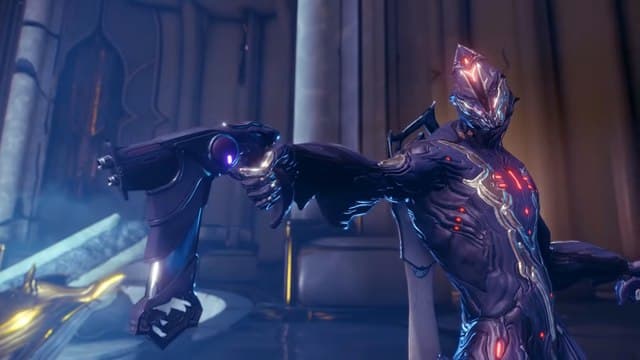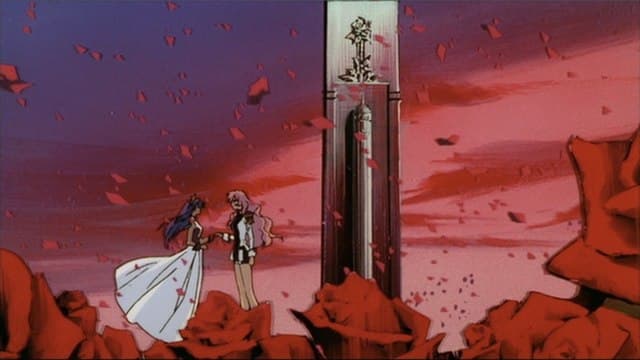“Is it love or desire?” This question winds its way through SARAZANMAI, the most recent work of famed anime director Kunihiko Ikuhara (Revolutionary Girl Utena). On its most basic level, the anime is the story of three teens who get turned into kappa and defeat monsters by pulling out their shirikodama (in mythology, an organ stored in the anus that contains the soul or, here, desire), earning “dishes of hope” that will eventually grant them a wish — you know, that old chestnut — but its eleven-episode run is also dense with metaphor.
Just in case you were in danger of not picking that up, the leader of the villainous Otter Empire sings the line “I am an abstract concept” in the final episode (did I mention it’s also a musical?). As for what he’s a metaphor of, we have to return to that question of desire. Always ambitious, Ikuhara uses SARAZANMAI to tackle a topic broad in scope and implications: the way capitalism, and more specifically media marketing, consumes, others, and ultimately discards sexual minorities.
More Like This:
- BAKI is “Guys Being Dudes”: The Anime
- 5 Queer Anime That Aren’t Yuri!!! On ICE
- Love Evangelion? Imagine Going to School With Its Creator

Food for the Machine
In the world of SARAZANMAI, very little is what it appears to be. The main characters transform into kappa and fight on the “field of desire,” which normal humans can’t see. The kappa prince can’t show his true form, and the kappa princess walks around as that most packaged image of desirability, an idol. And then, there are the boxes.
Each of the three protagonists carries their secrets in a “kappazon” branded box, and each is miserable about a connection they want to make but feel, for whatever reason, they can’t: Kazuki carries a costume of a local idol his brother looks up to, feeling he can only connect through a mask; Enta carries a gift for Kazuki, on whom he has a crush; and Toi carries a gun left behind by his brother, who had to flee town. As they are forced to open up to one another through the titular Sarazanmai, a sort of soul-baring session, the boxes disappear. At least, for the heroes.
The monsters-of-the-week aren’t so lucky. Each early episode follows a pattern: a local criminal is caught by Reo and Mabu, police officers who are secretly in service of the evil Otter Empire (they’ve been at war with the kappa forever, didn’t you know?); Reo, asking whether that person has love or desire, shoots them dead; then, through montage, their body is funneled through an automated boxing system that transforms them into a giant monster. As this happens, the cops sing the “Otter Soiya,” a mocking song that sneers at the listener to strive for more in their pathetic lives — it’s the kind of rhetoric that wouldn’t be out of place at a particularly aggressive motivational seminar. Their victims are individuals who feel they can’t connect, and the Otter Empire packages them as monsters.
But when the kappa trio is victorious, each monster battle ends with a strange sight: we see the victim’s innermost desires, which is generally a harmless fetish that had warped into whatever nonconsensual, invasive act they ended up committing because they had no outlet to enact it. A man who’d been shaving neighborhood cats wanted to be a furry, a guy stealing soccer balls wanted cock-and-ball torture, and so on. One only need to look at any kink-themed episode of a procedural to see this process in action; shows that might nominally give sympathetic lip service but also delight in lurid, prurient depictions of supposed icky deviancy. It was only very, very recently that trans and queer identity began to escape this orbit.
Each of these cases goes relatively uncommented on by the heroes, and it’s less meant to draw a direct parallel to the queer elements of the story than to set up a background precedent: that these are people who, with communication, could’ve had flourishing healthy desires; who turned instead to toxic or even violent outlets, and who ultimately became garish parodies in the service of the Otter Empire.

Words of Love
Having set its precedent, the show moves on to the big guns. As it turns out, the duo that have been creating Kappa Zombies all over town are kappa themselves, swayed to switch sides during a moment of weakness: Mabu dies protecting Reo, and an otter just so happens to appear and offer to return the grieving Reo’s partner, only for it to go terribly wrong, as the revived Mabu appears to be an emotionless doll thanks to his new mechanical heart.
What Reo doesn’t know is that Mabu was also offered a deal by the otters, told that he would be able to return to life and stay by his partner’s side so long as he never verbally expressed his love. And so the two are subtly set against one another by the system supposedly offering to support them. Reo grows increasingly irate, believing Mabu no longer loves him because he doesn’t say it; while Mabu turns to the otters’ offer of “maintenance” in the hopes of feeling desirable again.
It’s no coincidence that in their service to the otter empire, Reo and Mabu disguise themselves as cops: a force that cannot change the law but upholds the status quo, and that overwhelmingly does more harm than good to the marginalized. They become cogs in the machine, perpetuators of their own oppression. It’s worth noting too that, the show’s absurd comedy aside, there’s a reason for the otters: the Japanese word for otter is “kawauso” (獺) and “uso” (嘘) means lie. An empire of liars.
The specter of BL (“Boy’s Love”) hangs over the depiction of their relationship. More than one commenter has noted that in among all the butt jokes, the venn diagram displayed each time a kappa zombie is ejected from reality (reading “no beginning, no ending, no connection”) bears a certain similarity to the acronym that the term “yaoi” stems from (no climax, no resolution, no meaning). While yaoi is often used as an interchangeable term with BL in western fandom, it originated as a term specific to male/male fanworks of existing media. It’s essentially the equivalent marker to PWP (porn without plot) in Western fanfiction.
The genre’s most popular works, particularly from the 1990s and 2000s, are rife with tropes like “I’m straight except for you,” the love interest being a rapist (excuse me, “overwhelmed by passion”), and the assumption that sexual position is a hard-and-fast indicator of personality. BL manga has blossomed and grown considerably over the past decade, gaining an increasingly diverse readership and beginning to take questions of identity and consent seriously. However, all the way up until the watershed success of Yuri!!! On ICE, it was the popular titles that clung to these tropes most tightly that were overwhelmingly chosen for adaptation (Junjou Romantica, Super Lovers, and the upcoming Ten Count are just some recent examples).

Together They Are Sarazanmai
This history lurks in the background of Reo and Mabu’s struggles, as they are simultaneously kept from one another and Mabu in particular is rendered an object for consumption. As part of the “maintenance” on his robotic heart, Mabu repeatedly strips naked and submits himself to innuendo-laden scenes as he tries to relearn how to cook for Reo. His cheeks flush, his breath catches, his weirdly defined chest muscles glisten — it is all as sexual as it can be for the consumption of the viewer, and yet there is no joy in it. At the climax of the “Otter Soiya” Reo rips Mabu’s shirt open and pulls his heart out, but Mabu’s eyes are looking away, and Reo still sees him as a “broken” version of his partner. There is sex, but no love. While the Otter Empire consumes their bodies, it breaks their loving, communicative relationship as queer men to pieces.
Outside of the BL and yuri subgenres, which are specifically marketed as same gender romance, queer desire is heavily downplayed or outright censored in anime. This is especially true of queer relationships between men, where all the affection and devotion in the world is permissible as long as nobody calls a spade a spade. For some reason, without the “magic words,” even visible queerness can be vanquished by the most half-hearted of no-homos. And so, Mabu is unwittingly trapped. No matter how he attempts to show his love through acts, Reo can’t see them.
There is, of course, a way out of this rule: death. As this thread beautifully explains, once queerness transitions from implicit to explicit it almost invariably torpedoes that character’s chance for a happy ending. At best, they’ll fade into the background, content to be supportive in the knowledge that their feelings could never possibly be reciprocated (the show challenges this trope as well with endearing walking disaster Enta). At worst, they’ll die horribly for the sake of supposed pathos. Even Ikuhara himself has been complicit in this pattern; from the landmark queer villain couple in Sailor Moon to the lost and pining Mikage of Revolutionary Girl Utena.
And Mabu does die. When he and Reo at last perform the Sarazanmai together and he declares his eternal love, his mechanical heart stops beating. But SARAZANMAI rewrites the ending, rewarding the two for reaching a point of honest communication by returning them to their original selves. Their confession isn’t death but freedom from a system profiting off of their misery. They revert to a sleeping form, visualized as two linked circles reminiscent of wedding bands. And in the end they are reborn — no longer tools, and no longer cops.

A Hope for the Future
For all of that, the show is not so simple as to brand “desire” as evil and “love” as pure and worthy. That dichotomy is simply another trap, demonizing queer sex and reframing queer romance in such a way that then sets it up to be misrepresented as “just friendship.” Ikuhara made that double standard the main focus of his previous series, Yurikuma Arashi, and it returns here as a secondary thread. While desire can be twisted and exploited, on its own it’s a neutral and even positive force. It’s desire that pushes the kappa trio to fight for their connections to one another. In the finale, it’s Reo and Mabu who, reprising the line “Don’t let go of your desires” from their duet, become a literal guiding light to the trio as they struggle through a supernatural darkness brought down by the Otter Empire.
Ultimately, the series argues that desire is a healthy and important thing — it just has to be combined with open, honest communication. The sarazanmai doesn’t make characters’ problems vanish, but it does force them to face both themselves and their loved ones. At risk of losing their connections to one another, the kappa trio are shown a dark potential future: Kazuki injures his leg and can’t pursue his soccer dreams; Enta confesses his feelings only to be left in tears; and Toi goes to prison. But even then, they say, it’s worth it.
The queer youth of tomorrow face a future that is unknown — and yet one that is implicitly hopeful, as Enta rejects the temptation of the Otter Empire in a scene made to parallel Reo’s moment of weakness. Aware of the dangers of the system, and the potential for plain human error, they choose to go forward together anyway. It is triumphant, earnest, and more than a little awe-inspiring. Here’s to hoping the real media landscape can live up to such glowing optimism.

